 Any musical work which has a long. complex, and– dare I say it? –troubled history — can’t help but raise a red flag. Is the artist wrestling with something alive and kicking, or is he or she merely tinkering? Lou Harrsion’s “gay opera” Young Caesar, which began as a 1969 commission from the group Encounters, was first staged as a puppet opera for vocalists and 5 instrumentalists. A subsequent version, for 11 instrumentalists, onstage singers, and full chorus, followed, and this one, performed by the Portland Gay Men’s Chorus in 1988, was roundly criticized, though the performers, some of whom were “coming out” for the first time in it, embraced the work wholeheartedly. A further revised version for the Lincoln Center Festival, to be directed by Mark Morris, and conducted by Dennis Russell Davies, fell through Yet Harrison ( 1917- 2003 ) persisted — “I’m going to get that work right before I die ” — and French Canadian conductor Nicole Paiement, who premiered “the final cut”, or Urtext, if you will, in San Francisco in mid-February was an avid midwife in the process. But what are we to make of the final product? Was it worth the wait, or is it too little and too late? A little bit of both, but more of the latter.
Any musical work which has a long. complex, and– dare I say it? –troubled history — can’t help but raise a red flag. Is the artist wrestling with something alive and kicking, or is he or she merely tinkering? Lou Harrsion’s “gay opera” Young Caesar, which began as a 1969 commission from the group Encounters, was first staged as a puppet opera for vocalists and 5 instrumentalists. A subsequent version, for 11 instrumentalists, onstage singers, and full chorus, followed, and this one, performed by the Portland Gay Men’s Chorus in 1988, was roundly criticized, though the performers, some of whom were “coming out” for the first time in it, embraced the work wholeheartedly. A further revised version for the Lincoln Center Festival, to be directed by Mark Morris, and conducted by Dennis Russell Davies, fell through Yet Harrison ( 1917- 2003 ) persisted — “I’m going to get that work right before I die ” — and French Canadian conductor Nicole Paiement, who premiered “the final cut”, or Urtext, if you will, in San Francisco in mid-February was an avid midwife in the process. But what are we to make of the final product? Was it worth the wait, or is it too little and too late? A little bit of both, but more of the latter.
What went wrong? Well, judged from what saw or didn’t see — timidity on all sides, as well as narration, recitatives, and spoken texts ad infinitum, which made it sound like a largely 2 hour 41 minute lecture instead of a live theatrical event, which is incredible given the fact that Young Caesar purports to show how the man who’d one day rule the world, started to become that person. But Robert Gordon’s book fails to deliver the goods, and if the spine of a piece isn’t strong how can it stand up and move, and if the subject, forget style, doesn’t catch fire, all the revisions in the world amount to nothing but window dressing. That’s sad because Harrison has been the important, influential — on Paul Dresher and many others — and sometimes great composer of pieces like Mass to St. Anthony (1939), Varied Trio (1987), Piano Concerto with Selected Orchestra (1985), and the groundbreaking, with Cage, Double Music (1941).
But Harrison’s instrumental writing here for a 17 member pit band, including 5 percussionists, failed to drive the piece forward. Sure, you could argue that this composer isn’t interested in verismo melodramatics, and that he’s all for an Asian-inflected timelessness, and you’de be right, but the music as music, and the drama as drama, failed to hold the attention.
And so we’re stuck with a talky “drama” which covers the coming of age ceremony at 16 of Caesar (tenor Eleazar Rodriguez), the political machinations of his Aunt Julia (mezzo Wendy Hillhouse), his departure for Bithynia — a kingdom bordering the Black Sea in what’s now Turkey — to get ships for General Themus (baritone William O’Neill ), where he meets King Nicomedes IV, Philopater (baritone Eugene Brancoveanu ), has his first and possibly only gay affair — historians, though not Gordon are divided on this — and departs for Rome at age 19, a changed man, poised to conquer the world. But we didn’t see, much less feel that here in director Brian Staufenbiel’s version. Instead we saw a Caesar in an unbecoming white tunic — the ugly, baldly amateurish costumes were by Richard Battle — a Nicomedes who looked like Virginia Mayo’s Helena in Victor Saville’s pic The Silver Chalice ( 1954 ), and a drag queen, outfitted in a rosy mesh top; a black-robed chorus, who held white masks like lorgnettes — was this supposed to be camp ? — and a Julia with a Bette Midler corona of shocking red republican curls.
The whole production played like an uneasy mix of the amateur and the thoroughly professional. The only real winners here were Branconveanu, who despite the cards being stacked against him, managed to negotiate his part’s high tessitura with skill and point, and project a stage presence which overpowered Rodriguez’s adequately sung though barely stage present one — perhaps his character’s supposed to be ” a work in progress” ? — Hillhouse’s amusing Julia, Ensemble Parallele’s 19-member male chorus, and Paiement’s expert orchestra, especially in the second act overture. Strong solo turns were delivered by Yvonne Fong Lai on tack piano and celesta, Jennifer Cass on harp, Katie Rife on marimba, Graeme Jennings, violin, and Katrina Weeks, viola. But the erotic charge this piece should have had was largely missng — Caesar and Nicomedes’ bedding looked accidental and no fun despite a glaring scarlet sheet — though a white thong dance between Lawrence Pech and Peter Brandenhoff — and a still as marble pose by Peter Brandenhoff who seemed the very embodient of Apollo struck paydirt. I’m sure the 1st century BCE was more interesting than what we got here.
Even Mankiewicz’s much maligned, Cleopatra (1963), despite its second half longueurs, is a lot more fun, and in every way more probing, even profound — the phenomenal score’s by Alex North. Would that Young Caesar’s book, conception, and yes, music, ascended, even briefly, to its genuine heights.
Ensemble Parallle will perform Young Caesar again, on April 3rd, 2007 at The UCSC Recital Hall, University of California, Santa Cruz. ph. 831.459.2159. http://events.ucsc.edu.tickets/.
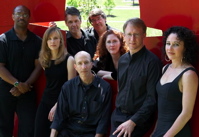 One of the hottest things in Philadelphia has to be the Relâche chamber ensemble. They’ve performed and recorded work by a wide variety of composers in the Downtown tradition including Kyle Gann, Michael Nyman, Robert Ashley, Lois V. Vierk, James Tenney, and they’re about to hit the road with Elliott Sharp’s new work “Evolute.” The piece is, to quote the Relâche press release, “a new chamber- and electronic musical work. . . [in which] Relâche’s octet instrumentation will be processed by Sharp through live electronics, resulting in a swirling mass of acoustic and electronic sound – a live classical remix. . . Evolute’s title comes from the differential geometry of curves, referring to the ways that a new shapes can evolve out of an old one. The work is a cascade of ideas fighting for their survival and reproduction in a veritable Darwinian celebration.” Hot stuff. The program also includes John King’s “Road Map,” Sophia Serghi’s “Pleiades,” and Fred Frith’s “shading my face it shall be you.” You can hear this program on Thursday, March 22nd at 8:00 PM at the University of Delaware, or Friday March 23rd at 8:00 PM at Trinity Center in Philadelphia.
One of the hottest things in Philadelphia has to be the Relâche chamber ensemble. They’ve performed and recorded work by a wide variety of composers in the Downtown tradition including Kyle Gann, Michael Nyman, Robert Ashley, Lois V. Vierk, James Tenney, and they’re about to hit the road with Elliott Sharp’s new work “Evolute.” The piece is, to quote the Relâche press release, “a new chamber- and electronic musical work. . . [in which] Relâche’s octet instrumentation will be processed by Sharp through live electronics, resulting in a swirling mass of acoustic and electronic sound – a live classical remix. . . Evolute’s title comes from the differential geometry of curves, referring to the ways that a new shapes can evolve out of an old one. The work is a cascade of ideas fighting for their survival and reproduction in a veritable Darwinian celebration.” Hot stuff. The program also includes John King’s “Road Map,” Sophia Serghi’s “Pleiades,” and Fred Frith’s “shading my face it shall be you.” You can hear this program on Thursday, March 22nd at 8:00 PM at the University of Delaware, or Friday March 23rd at 8:00 PM at Trinity Center in Philadelphia.  A good time is to be had this Saturday night at Zankel Hall.
A good time is to be had this Saturday night at Zankel Hall. 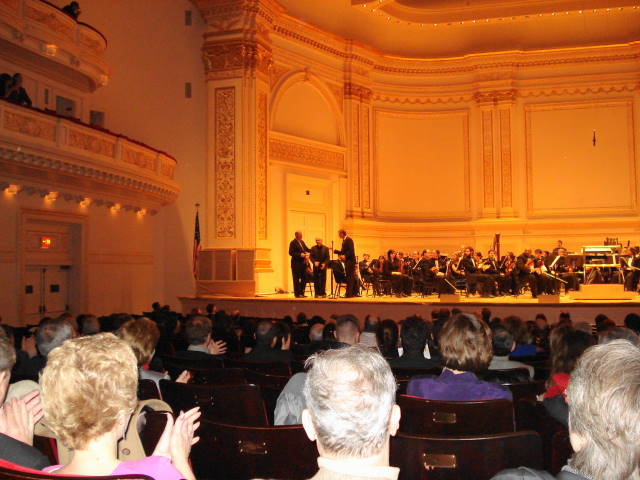
 Who is
Who is 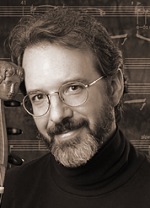 Christopher Hopkins is an assistant professor of music composition at Iowa State University of Science and Technology, where he teaches courses in composition, music technology, sound synthesis and orchestration. He is director of the Lipa Festival of Contemporary Music. As a composer he works in both experimental and traditional forms, with special interests in electroacoustic music, innovative notations and instrumental techniques, and dialectics between historical and contemporary musical forms.
Christopher Hopkins is an assistant professor of music composition at Iowa State University of Science and Technology, where he teaches courses in composition, music technology, sound synthesis and orchestration. He is director of the Lipa Festival of Contemporary Music. As a composer he works in both experimental and traditional forms, with special interests in electroacoustic music, innovative notations and instrumental techniques, and dialectics between historical and contemporary musical forms.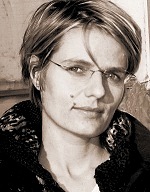 Katharina grew up in Zurich, playing piano and singing in choir through her teens. Her formal music studies began at Jazz School Zurich, but she quickly bailed to Boston and the Berklee College of Music for her BA. Jump again to Zurich, then over to the Royal Academy of Music in London for her MA, and finally (?…) hop back over to the States and Columbia for her DMA. Her works, electronic & acoustic, are often inspired and linked with the visual arts, theater and inquiries into perceptual and phenomenological issues.
Katharina grew up in Zurich, playing piano and singing in choir through her teens. Her formal music studies began at Jazz School Zurich, but she quickly bailed to Boston and the Berklee College of Music for her BA. Jump again to Zurich, then over to the Royal Academy of Music in London for her MA, and finally (?…) hop back over to the States and Columbia for her DMA. Her works, electronic & acoustic, are often inspired and linked with the visual arts, theater and inquiries into perceptual and phenomenological issues.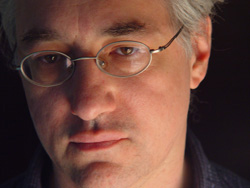 Sebastian Currier has won the 2007 University of Louisville Grawemeyer Award for Music Composition for “Static,” a six-movement piece for flute, clarinet, violin, cello and piano.
Sebastian Currier has won the 2007 University of Louisville Grawemeyer Award for Music Composition for “Static,” a six-movement piece for flute, clarinet, violin, cello and piano. Any musical work which has a long. complex, and– dare I say it? –troubled history — can’t help but raise a red flag. Is the artist wrestling with something alive and kicking, or is he or she merely tinkering? Lou Harrsion’s “gay opera” Young Caesar, which began as a 1969 commission from the group Encounters, was first staged as a puppet opera for vocalists and 5 instrumentalists. A subsequent version, for 11 instrumentalists, onstage singers, and full chorus, followed, and this one, performed by the Portland Gay Men’s Chorus in 1988, was roundly criticized, though the performers, some of whom were “coming out” for the first time in it, embraced the work wholeheartedly. A further revised version for the Lincoln Center Festival, to be directed by Mark Morris, and conducted by Dennis Russell Davies, fell through Yet Harrison ( 1917- 2003 ) persisted — “I’m going to get that work right before I die ” — and French Canadian conductor Nicole Paiement, who premiered “the final cut”, or Urtext, if you will, in San Francisco in mid-February was an avid midwife in the process. But what are we to make of the final product? Was it worth the wait, or is it too little and too late? A little bit of both, but more of the latter.
Any musical work which has a long. complex, and– dare I say it? –troubled history — can’t help but raise a red flag. Is the artist wrestling with something alive and kicking, or is he or she merely tinkering? Lou Harrsion’s “gay opera” Young Caesar, which began as a 1969 commission from the group Encounters, was first staged as a puppet opera for vocalists and 5 instrumentalists. A subsequent version, for 11 instrumentalists, onstage singers, and full chorus, followed, and this one, performed by the Portland Gay Men’s Chorus in 1988, was roundly criticized, though the performers, some of whom were “coming out” for the first time in it, embraced the work wholeheartedly. A further revised version for the Lincoln Center Festival, to be directed by Mark Morris, and conducted by Dennis Russell Davies, fell through Yet Harrison ( 1917- 2003 ) persisted — “I’m going to get that work right before I die ” — and French Canadian conductor Nicole Paiement, who premiered “the final cut”, or Urtext, if you will, in San Francisco in mid-February was an avid midwife in the process. But what are we to make of the final product? Was it worth the wait, or is it too little and too late? A little bit of both, but more of the latter. Let’s go to the old mailbag and see what’s happening in the exciting world of new music. Ah, here’s something. Our friends at the American Music Center are launching
Let’s go to the old mailbag and see what’s happening in the exciting world of new music. Ah, here’s something. Our friends at the American Music Center are launching